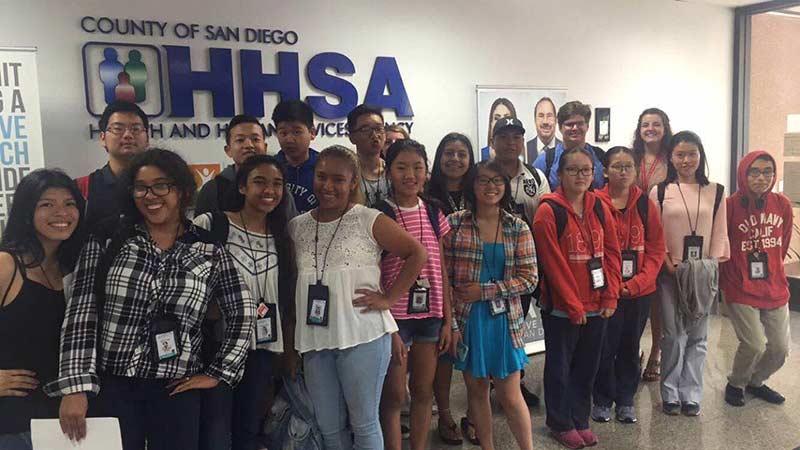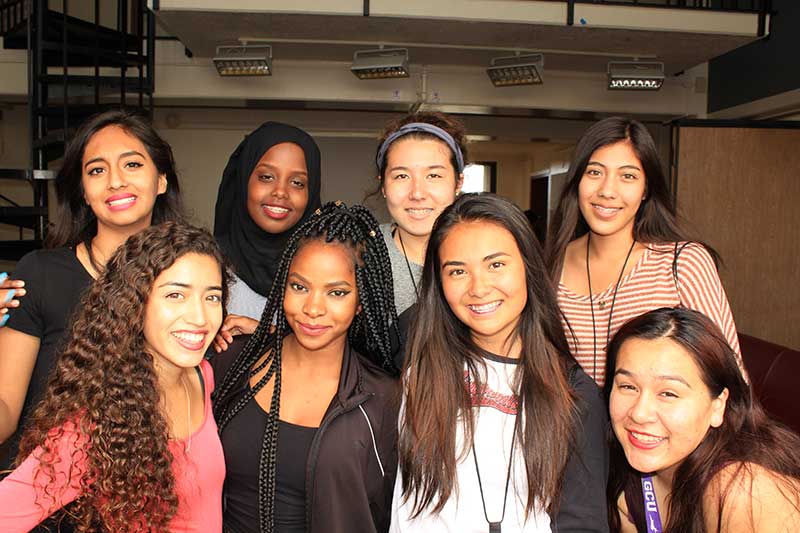1 September 2016
Reality Changers and Imperial Valley students: First-generation college-bound students face their future

In a very small classroom at UC San Diego, about 20 attentive students are giving presentations. But these aren’t the students you’d expect to see on a college campus – they are high schoolers who are part of a three-week summer program called Academic Connections, which prepares young students for college life, both academically and socially.
In this particular class, Disease Detectives: Introduction to Epidemiology, the students are learning about the causes and effects of disease and illness. One of the students presenting is Paola Duarte, a 16-year-old from Southern California’s Imperial Valley.
Duarte is a first-generation college-bound student and is thrilled to be on the UC San Diego campus. She is especially grateful that, as part of the migrant family program at her high school, she received a full scholarship ($3,900) to attend the summer college prep program. UC San Diego Extension provides scholarships for its Academic Connections program for low-income, high-potential youth to give them a chance to become first generation college students.
“I am excited to be the first one in my family to go to college and to show them that I can do it,” said Duarte, who had to write an essay and collect recommendation letters to get accepted into the program. “This campus is the only UC that has human biology, which I want to major in. I wanted to come here to learn more about the campus and get college credits so I could have the possibility of being admitted to UC San Diego. I also wanted to come here because I wanted to spend my summer doing great things and to improve academically.”
Besides boosting her college-prep experience, Duarte got a good taste of campus life during the summer residential program – literally.
“I like to live on campus and eat food from the cafeteria,” she said. “It’s an experience. You are getting prepared for when you go to college; you know what it’s like not to have your mom’s food every day.”
Making new friends from around the world is another bonus.
“It’s very cool because we live in Imperial Valley, which is considered a low income area, so many people there don’t have the opportunity to pay for this program,” Duarte said. “I really like the diversity here. I have learned a lot from many cultures and have made friends from different countries: China, Japan and Saudi Arabia.”
Duarte has one more year of high school, but she already has her college and career plans mapped out. After earning her bachelor’s degree, she plans to go to medical school to become a surgeon.
“I believe there is a purpose in life, and I think my purpose is to help other people,” she said, explaining that she was frequently sick as a young child. “I want to dedicate my life to that.”
Fellow classmate Ciarra Reyes also wants to be involved in the medical field. Reyes, who was born and raised in Brawley in the Imperial Valley, is the youngest of six kids. She, too, attended the Academic Connections program on a full scholarship.
“This is a really good way to experience college life and be prepared mentally and know what your choices are and where you want to go,” she said. “Before this, I wanted to be a doctor, but now I may want to go into epidemiology or work for the CDC (Centers for Disease Control).”
Reyes, who celebrated her sixteenth birthday during the summer program, said the social aspect was just as important as the rich academic experience she received. Back home in the Imperial Valley, she is not part of any sports teams or clubs, but during the Academic Connections program, Reyes played soccer and Frisbee with her peers, as well as joined in on karaoke night. She also made new friends with teens from across the globe.
“With the connections you make here, if you open up to different people from different places, you can have lifelong friends,” she said. “I have one roommate from China and another roommate from Atlanta, Georgia. In Brawley, there are a lot of the same people. When we come here, other people are actually interested in our culture and it makes us feel more important and connected to our own culture. I am very grateful to be here; it’s a great opportunity to learn more about yourself and what you can do with your future.”
Thanks to the Academic Connections program, 16-year-old Eric Lechuga is another step closer to realizing his future – a career in medicine. Lechuga, who was able to attend through a scholarship from Reality Changers, which is a nonprofit that helps low-income youth become first-generation college students. Lechuga, for example, will be the first one in his family to go to college as his two older siblings didn’t even finish high school.
“I worked hard and got a good GPA so I could get a scholarship to come here,” he said. “My motivation to be here is I wanted to make my mom proud. When I told her that I got accepted, she was really happy and started crying.”
Lechuga, who will attend Hoover High School in San Diego in the fall as a junior, said the Academic Connections program also gave him the opportunity to meet new and different people and to broaden his view of the world.
“If you have more understanding about other people’s cultures you will get along with more people,” he said. “Some people are closed minded and only focus on their own culture, which leads to racism.”

Image by Ashley Emuka, July 13, 2016
In fact, one of the main missions of the Academic Connections program is to foster a unified global village, which ties into Chancellor Pradeep Khosla’s initiative to broaden the university’s reach in an effort to create lasting partnerships with communities across the region and world.
“By partnering with the community, we can sustain a pipeline each year that helps build relationships and shapes well-rounded citizens,” said Ed Abeyta, assistant dean for community engagement and director of pre-college programs at UC San Diego Extension. “Our students from the Imperial Valley are a good example. No matter where they go they will have options to go to college. They are not only going to be good academically but they will also be good citizens. We teach them to understand themselves, how to work with others, how to disagree with civility, and ultimately find common purpose to solve problems in the world.”